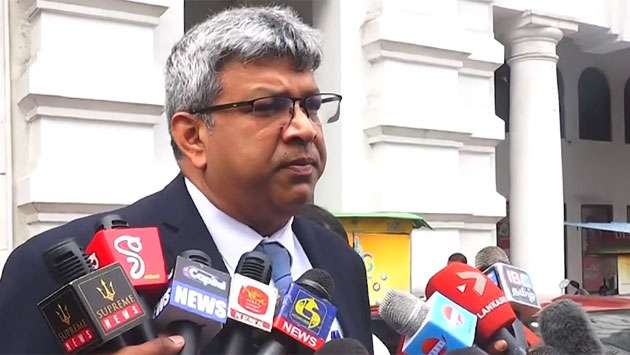--By A Staff Writer

(Lanka-e-News -02.April.2025, 11.00 PM) The relationship between Parliament and the government of the day rests on one fundamental principle: the government must retain the confidence of Parliament. This tenet of constitutional democracy is neither a mere formality nor a technicality—it is the cornerstone of governance. The government derives its authority from Parliament, and its legitimacy hinges on sustaining that confidence.
This is precisely why the question of removing Deshabandu Tennakoon, the suspended Inspector General of Police (IGP), is not a matter of individual interpretation but a test of Parliament’s authority. Former Justice Minister Wijeyadasa Rajapakshe’s attempt to dismiss the parliamentary motion against Tennakoon on technical grounds conveniently ignores this foundational principle.
Justice Minister Harshana Nanayakkara decisively countered Rajapakshe’s stance, stating unequivocally that there is no legal barrier preventing Parliament from proceeding with the motion. This assertion is not based on political whims but on constitutional reasoning. The Supreme Court’s interim order restraining Tennakoon from functioning as IGP underscores the fact that he is, indeed, still the IGP—an inconvenient reality that Rajapakshe seems determined to sidestep.
Rajapakshe’s argument—that Tennakoon is no longer the IGP and therefore not subject to parliamentary scrutiny—collapses under the weight of its own contradictions. The Supreme Court’s ruling explicitly acknowledges Tennakoon’s position, even if he is currently restrained from performing his duties. Parliament, therefore, retains its prerogative to bring a motion against him, particularly when allegations of misconduct are involved.
Parliamentary democracy is not a passive spectator sport. It is a dynamic system in which elected representatives exercise oversight, demand accountability, and, when necessary, challenge executive decisions. The notion that Parliament cannot move against Tennakoon simply because legal proceedings are pending is a dangerous dilution of its constitutional authority.
The motion against Tennakoon is centered on allegations of misconduct. This is a separate matter from the Supreme Court’s interim order, which pertains to his appointment. To conflate the two is to misrepresent the fundamental distinction between judicial review and parliamentary oversight. The former determines legality; the latter ensures accountability.
Rajapakshe’s position also raises a pertinent question: If Parliament cannot move against an official accused of misconduct simply because a case is before the courts, does this mean that all parliamentary oversight must be placed on hold whenever legal proceedings are initiated? Such a notion would be absurd. It would create a perverse incentive for officials facing scrutiny to deliberately entangle themselves in legal proceedings to evade parliamentary accountability.
The National People's Power (NPP) party’s motion against Tennakoon is not just politically sound—it is constitutionally robust. Speaker Mahinda Yapa Abeywardena’s acceptance of the motion is a reaffirmation of Parliament’s role in holding public officials accountable. To suggest that this undermines parliamentary powers, as Rajapakshe has done, is to fundamentally misunderstand—or deliberately misrepresent—the role of Parliament in a democracy.
Nanayakkara’s assertion that the motion is not sub judice (i.e., under judicial consideration and therefore prohibited from discussion) is crucial. Sub judice applies to matters where parliamentary discussion could interfere with an ongoing legal case. However, in this instance, Parliament is addressing allegations of misconduct, a domain that remains firmly within its purview.
The broader implication of this debate is not just about Deshabandu Tennakoon but about the principle of parliamentary supremacy in governance. If Parliament’s authority to bring motions against officials can be casually dismissed by selective legal interpretations, it sets a dangerous precedent.
Rajapakshe’s stance is not merely a misinterpretation of legal principles—it is a tactical maneuver aimed at shielding a politically sensitive appointment from scrutiny. But such maneuvering cannot override the core principle that Parliament’s confidence must be earned and retained.
Parliament does not act on the whims of individual ministers; it acts as the representative body of the people. If an official’s conduct is in question, Parliament has every right—indeed, an obligation—to take action.
The attempt to undermine Parliament’s authority by invoking convoluted legal arguments is not just intellectually dishonest but constitutionally unsound. The government’s legitimacy is tied to the confidence of Parliament, and any action—or inaction—that contradicts this principle erodes democratic governance.
Rajapakshe’s interpretation is not just incorrect; it is irrelevant. Parliament has the power to bring a motion against Deshabandu Tennakoon, regardless of his personal opinions on the matter. The principle at stake here is not one of legal semantics but of democratic accountability. And in that regard, Parliament must—and will—prevail.
-By A Staff Writer
---------------------------
by (2025-04-02 18:33:27)
Leave a Reply